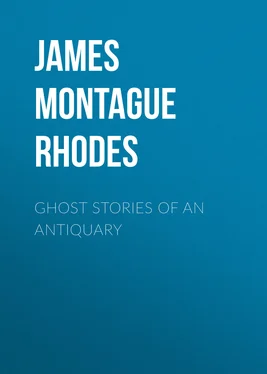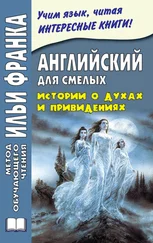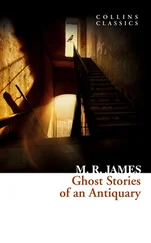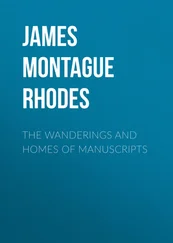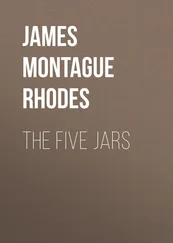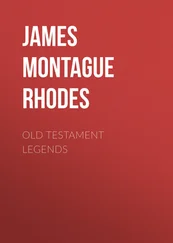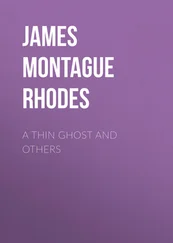Montague James - Ghost Stories of an Antiquary
Здесь есть возможность читать онлайн «Montague James - Ghost Stories of an Antiquary» — ознакомительный отрывок электронной книги совершенно бесплатно, а после прочтения отрывка купить полную версию. В некоторых случаях можно слушать аудио, скачать через торрент в формате fb2 и присутствует краткое содержание. Жанр: foreign_prose, Европейская старинная литература, foreign_antique, на английском языке. Описание произведения, (предисловие) а так же отзывы посетителей доступны на портале библиотеки ЛибКат.
- Название:Ghost Stories of an Antiquary
- Автор:
- Жанр:
- Год:неизвестен
- ISBN:нет данных
- Рейтинг книги:4 / 5. Голосов: 1
-
Избранное:Добавить в избранное
- Отзывы:
-
Ваша оценка:
- 80
- 1
- 2
- 3
- 4
- 5
Ghost Stories of an Antiquary: краткое содержание, описание и аннотация
Предлагаем к чтению аннотацию, описание, краткое содержание или предисловие (зависит от того, что написал сам автор книги «Ghost Stories of an Antiquary»). Если вы не нашли необходимую информацию о книге — напишите в комментариях, мы постараемся отыскать её.
Ghost Stories of an Antiquary — читать онлайн ознакомительный отрывок
Ниже представлен текст книги, разбитый по страницам. Система сохранения места последней прочитанной страницы, позволяет с удобством читать онлайн бесплатно книгу «Ghost Stories of an Antiquary», без необходимости каждый раз заново искать на чём Вы остановились. Поставьте закладку, и сможете в любой момент перейти на страницу, на которой закончили чтение.
Интервал:
Закладка:
'Well, Mrs Bunch, I've no wish to argue with you: all I say is, if you choose to go to the far bin, and lay your ear to the door, you may prove my words this minute.'
'What nonsense you do talk, Mr Parkes—not fit for children to listen to! Why, you'll be frightening Master Stephen there out of his wits.'
'What! Master Stephen?' said Parkes, awaking to the consciousness of the boy's presence. 'Master Stephen knows well enough when I'm a-playing a joke with you, Mrs Bunch.'
In fact, Master Stephen knew much too well to suppose that Mr Parkes had in the first instance intended a joke. He was interested, not altogether pleasantly, in the situation; but all his questions were unsuccessful in inducing the butler to give any more detailed account of his experiences in the wine-cellar.
We have now arrived at March 24, 1812. It was a day of curious experiences for Stephen: a windy, noisy day, which filled the house and the gardens with a restless impression. As Stephen stood by the fence of the grounds, and looked out into the park, he felt as if an endless procession of unseen people were sweeping past him on the wind, borne on resistlessly and aimlessly, vainly striving to stop themselves, to catch at something that might arrest their flight and bring them once again into contact with the living world of which they had formed a part. After luncheon that day Mr Abney said:
'Stephen, my boy, do you think you could manage to come to me tonight as late as eleven o'clock in my study? I shall be busy until that time, and I wish to show you something connected with your future life which it is most important that you should know. You are not to mention this matter to Mrs Bunch nor to anyone else in the house; and you had better go to your room at the usual time.'
Here was a new excitement added to life: Stephen eagerly grasped at the opportunity of sitting up till eleven o'clock. He looked in at the library door on his way upstairs that evening, and saw a brazier, which he had often noticed in the corner of the room, moved out before the fire; an old silver-gilt cup stood on the table, filled with red wine, and some written sheets of paper lay near it. Mr Abney was sprinkling some incense on the brazier from a round silver box as Stephen passed, but did not seem to notice his step.
The wind had fallen, and there was a still night and a full moon. At about ten o'clock Stephen was standing at the open window of his bedroom, looking out over the country. Still as the night was, the mysterious population of the distant moon-lit woods was not yet lulled to rest. From time to time strange cries as of lost and despairing wanderers sounded from across the mere. They might be the notes of owls or water-birds, yet they did not quite resemble either sound. Were not they coming nearer? Now they sounded from the nearer side of the water, and in a few moments they seemed to be floating about among the shrubberies. Then they ceased; but just as Stephen was thinking of shutting the window and resuming his reading of Robinson Crusoe , he caught sight of two figures standing on the gravelled terrace that ran along the garden side of the Hall—the figures of a boy and girl, as it seemed; they stood side by side, looking up at the windows. Something in the form of the girl recalled irresistibly his dream of the figure in the bath. The boy inspired him with more acute fear.
Whilst the girl stood still, half smiling, with her hands clasped over her heart, the boy, a thin shape, with black hair and ragged clothing, raised his arms in the air with an appearance of menace and of unappeasable hunger and longing. The moon shone upon his almost transparent hands, and Stephen saw that the nails were fearfully long and that the light shone through them. As he stood with his arms thus raised, he disclosed a terrifying spectacle. On the left side of his chest there opened a black and gaping rent; and there fell upon Stephen's brain, rather than upon his ear, the impression of one of those hungry and desolate cries that he had heard resounding over the woods of Aswarby all that evening. In another moment this dreadful pair had moved swiftly and noiselessly over the dry gravel, and he saw them no more.
Inexpressibly frightened as he was, he determined to take his candle and go down to Mr Abney's study, for the hour appointed for their meeting was near at hand. The study or library opened out of the front-hall on one side, and Stephen, urged on by his terrors, did not take long in getting there. To effect an entrance was not so easy. It was not locked, he felt sure, for the key was on the outside of the door as usual. His repeated knocks produced no answer. Mr Abney was engaged: he was speaking. What! why did he try to cry out? and why was the cry choked in his throat? Had he, too, seen the mysterious children? But now everything was quiet, and the door yielded to Stephen's terrified and frantic pushing.
On the table in Mr Abney's study certain papers were found which explained the situation to Stephen Elliott when he was of an age to understand them. The most important sentences were as follows:
'It was a belief very strongly and generally held by the ancients—of whose wisdom in these matters I have had such experience as induces me to place confidence in their assertions—that by enacting certain processes, which to us moderns have something of a barbaric complexion, a very remarkable enlightenment of the spiritual faculties in man may be attained: that, for example, by absorbing the personalities of a certain number of his fellow-creatures, an individual may gain a complete ascendancy over those orders of spiritual beings which control the elemental forces of our universe.
'It is recorded of Simon Magus that he was able to fly in the air, to become invisible, or to assume any form he pleased, by the agency of the soul of a boy whom, to use the libellous phrase employed by the author of the Clementine Recognitions , he had "murdered". I find it set down, moreover, with considerable detail in the writings of Hermes Trismegistus, that similar happy results may be produced by the absorption of the hearts of not less than three human beings below the age of twenty-one years. To the testing of the truth of this receipt I have devoted the greater part of the last twenty years, selecting as the corpora vilia of my experiment such persons as could conveniently be removed without occasioning a sensible gap in society. The first step I effected by the removal of one Phoebe Stanley, a girl of gipsy extraction, on March 24, 1792. The second, by the removal of a wandering Italian lad, named Giovanni Paoli, on the night of March 23, 1805. The final "victim"—to employ a word repugnant in the highest degree to my feelings—must be my cousin, Stephen Elliott. His day must be this March 24, 1812.
'The best means of effecting the required absorption is to remove the heart from the living subject, to reduce it to ashes, and to mingle them with about a pint of some red wine, preferably port. The remains of the first two subjects, at least, it will be well to conceal: a disused bathroom or wine-cellar will be found convenient for such a purpose. Some annoyance may be experienced from the psychic portion of the subjects, which popular language dignifies with the name of ghosts. But the man of philosophic temperament—to whom alone the experiment is appropriate—will be little prone to attach importance to the feeble efforts of these beings to wreak their vengeance on him. I contemplate with the liveliest satisfaction the enlarged and emancipated existence which the experiment, if successful, will confer on me; not only placing me beyond the reach of human justice (so-called), but eliminating to a great extent the prospect of death itself.'
Читать дальшеИнтервал:
Закладка:
Похожие книги на «Ghost Stories of an Antiquary»
Представляем Вашему вниманию похожие книги на «Ghost Stories of an Antiquary» списком для выбора. Мы отобрали схожую по названию и смыслу литературу в надежде предоставить читателям больше вариантов отыскать новые, интересные, ещё непрочитанные произведения.
Обсуждение, отзывы о книге «Ghost Stories of an Antiquary» и просто собственные мнения читателей. Оставьте ваши комментарии, напишите, что Вы думаете о произведении, его смысле или главных героях. Укажите что конкретно понравилось, а что нет, и почему Вы так считаете.
